 Petzlover
Petzlover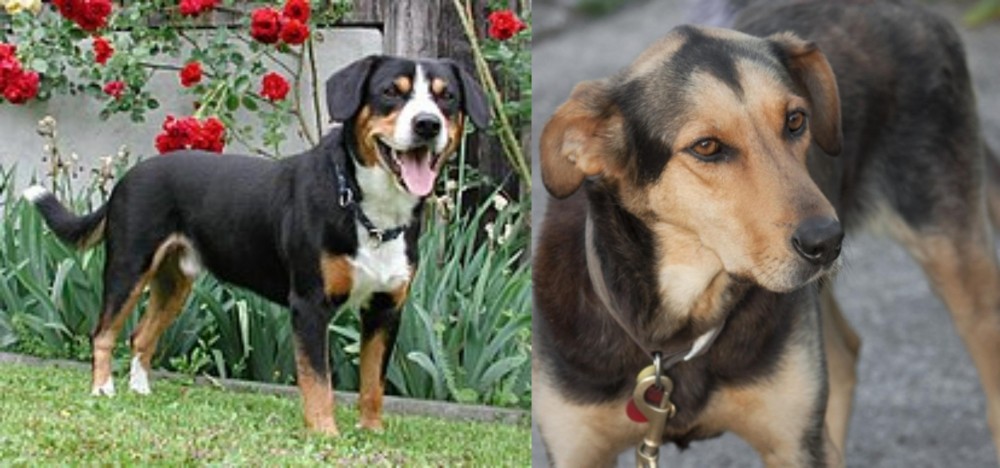 Entlebucher Mountain Dog is originated from Switzerland but Huntaway is originated from New Zealand. Entlebucher Mountain Dog may grow 16 cm / 6 inches shorter than Huntaway. Entlebucher Mountain Dog may weigh 16 kg / 35 pounds lesser than Huntaway. Both Entlebucher Mountain Dog and Huntaway has almost same life span. Entlebucher Mountain Dog may have more litter size than Huntaway. Entlebucher Mountain Dog requires Moderate Maintenance. But Huntaway requires Low Maintenance
Entlebucher Mountain Dog is originated from Switzerland but Huntaway is originated from New Zealand. Entlebucher Mountain Dog may grow 16 cm / 6 inches shorter than Huntaway. Entlebucher Mountain Dog may weigh 16 kg / 35 pounds lesser than Huntaway. Both Entlebucher Mountain Dog and Huntaway has almost same life span. Entlebucher Mountain Dog may have more litter size than Huntaway. Entlebucher Mountain Dog requires Moderate Maintenance. But Huntaway requires Low Maintenance
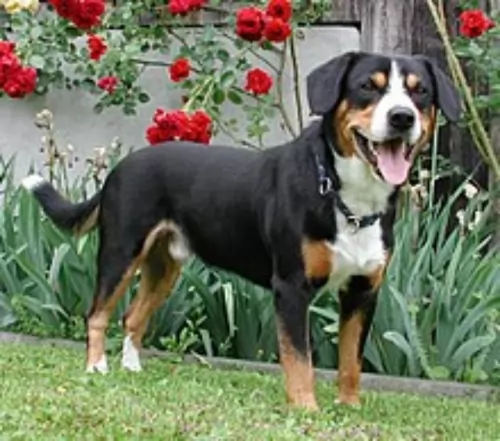 The Entlebucher Mountain Dog is the smallest of the Swiss Mountain Dogs, but he is still a powerful dog used to herd cattle. The four breeds are the Bernese Mountain Dog, the Greater Swiss Mountain Dog, the Appenzeller Mountain Dog and the Entlebucher. It was though that these dogs came to Switzerland with the Romans over 2 centuries ago. The Entlebucher was put to work guarding and herding sheep, pulling carts and flocking cattle. Toward the end of the 19th century the breed was on the edge of extinction because many were breeding them with German Shepherds. So, Franz Schertenleib, in 1889 brought all the existing Entlebuchers together and bred them. He is credited with keeping the breed alive.
The Entlebucher Mountain Dog is the smallest of the Swiss Mountain Dogs, but he is still a powerful dog used to herd cattle. The four breeds are the Bernese Mountain Dog, the Greater Swiss Mountain Dog, the Appenzeller Mountain Dog and the Entlebucher. It was though that these dogs came to Switzerland with the Romans over 2 centuries ago. The Entlebucher was put to work guarding and herding sheep, pulling carts and flocking cattle. Toward the end of the 19th century the breed was on the edge of extinction because many were breeding them with German Shepherds. So, Franz Schertenleib, in 1889 brought all the existing Entlebuchers together and bred them. He is credited with keeping the breed alive.
It is believed that the breed comes originally from a valley in the District of Cantons Lucerne and Berne, called Entlebuch. They were considered the same breed as the Appenzell Cattle Dog until 1913 when they were classified as a Mountain Dog – the fourth breed of Mountain Dog. The AKC did not recognize the breed until 2011.
 The Huntaway or New Zealand Huntaway is a herding dog that originated in the New Zealand sheep country. Their main purpose is to drive sheep and they are not an old breed. They were developed late in the 19th century for their working skills. The only real criteria was that they were black and tan. A dog must win a trial in order to be placed in the New Zealand Sheep Dog Trial Association studbook. They drive sheep mainly through their deep, loud voice.
The Huntaway or New Zealand Huntaway is a herding dog that originated in the New Zealand sheep country. Their main purpose is to drive sheep and they are not an old breed. They were developed late in the 19th century for their working skills. The only real criteria was that they were black and tan. A dog must win a trial in order to be placed in the New Zealand Sheep Dog Trial Association studbook. They drive sheep mainly through their deep, loud voice.
In the New Zealand high country there was a need for a working dog with stamina, agility and intelligence to work the sheep as a drover (herder). The dog had to be able to handle rough, steep land and work with very large groups of sheep. The sheer area of land that the sheep graze and the dog would have to cover, demanded that this dog have stamina and strength to cover large pasture land and work for days if necessary. Before this the shepherds had used British sheepdogs but they preferred dogs that barked while working. So they bred the British Sheepdogs with Collies, Border Collies, Labrador, Rottweiler, Doberman and other barking sheepdogs to create the Huntaway. In addition to the bark, they bred for stamina and size.
They were participating in field trails in 1870 and ads for them were seen in newspapers by 1884. They became a separate breed in the 20th century. Today they are spreading around the world and are becoming very popular. It is not recommended that they be kept as pets however, since they are true working dogs.
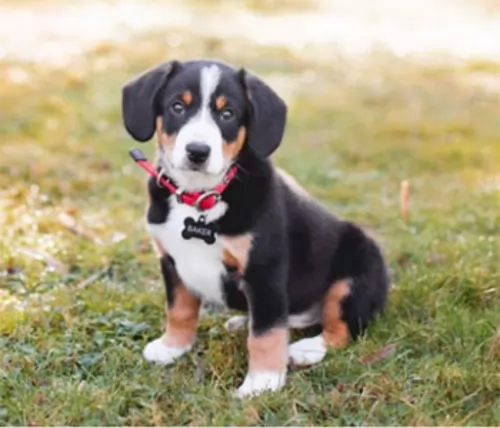 The Entlebucher Mountain Dog is a muscular, compact, and medium sized dog. Their heads are square, and the skull is flat. He has dark eyes that are alert and expressive in a friendly way. Their ears are triangular and hang on the side of his head. With compact feet, a muscular body and well angled hocks, he is a good looking dog and ready for his jobs.
The Entlebucher Mountain Dog is a muscular, compact, and medium sized dog. Their heads are square, and the skull is flat. He has dark eyes that are alert and expressive in a friendly way. Their ears are triangular and hang on the side of his head. With compact feet, a muscular body and well angled hocks, he is a good looking dog and ready for his jobs.
His coat is striking, and it is familiar in its closeness to the other Mountain Dogs coats. Yet he has some distinctive differences that tell you this is not a Bernese or a Swiss, it is an Entlebucher.
 The Huntaway is a large dog with a deep chest and a black and tan coat. They are strong, big and muscular with voices to match. They herd, head, work the sheep in pastures and force them into pens. They are bred to have that big authoritative, deep bark. They do not yap. Their bodies are well proportioned but longer than high. They have well - padded feet and a deep chest for stamina, along with strong legs and body that allows them to run fast and change directions at will.
The Huntaway is a large dog with a deep chest and a black and tan coat. They are strong, big and muscular with voices to match. They herd, head, work the sheep in pastures and force them into pens. They are bred to have that big authoritative, deep bark. They do not yap. Their bodies are well proportioned but longer than high. They have well - padded feet and a deep chest for stamina, along with strong legs and body that allows them to run fast and change directions at will.
The tail of a Huntaway if long, while their heads are shaped like blocks while the muzzle is long and the nose is black. They have dark, round eyes and long ears. An unusually attractive dog, they have dense fur with fringe on the tail and chest. There is characteristics a very large variety in the in the way the breed looks from one dog to the next. Thus they do not participate in confirmation events, as the standard is based on working characteristics rather than appearance guidelines. They are more a “class” than a “breed”.
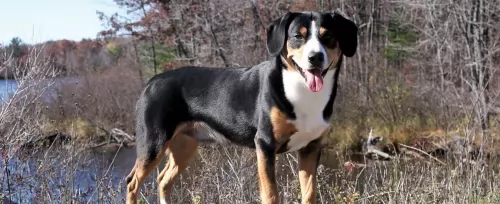 The Entle is a happy, clever dog that needs a job. They are intelligent and physical. They love people and throw themselves at you when they see you. They are loving and loyal but again he has to have a job.
The Entle is a happy, clever dog that needs a job. They are intelligent and physical. They love people and throw themselves at you when they see you. They are loving and loyal but again he has to have a job.
He makes a great watchdog, therapy dog or companion for your children. He only barks when he has to but is wary of strangers and he is territorial.
 The Huntaway is a pretty healthy breed, developed as it was from the sheepdogs and collies. They still face some inherited issues such as:
The Huntaway is a pretty healthy breed, developed as it was from the sheepdogs and collies. They still face some inherited issues such as:
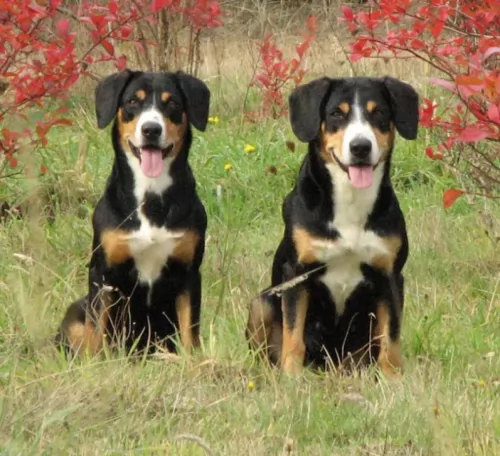 The Entlebucher Mountain Dog is a large working dog. He needs good solid food, but he doesn’t need to be overfed. Give him about 2-3 cups per day fed in 2-3 meals. Be careful of Bloat in the large dog.
The Entlebucher Mountain Dog is a large working dog. He needs good solid food, but he doesn’t need to be overfed. Give him about 2-3 cups per day fed in 2-3 meals. Be careful of Bloat in the large dog.
The Entlebucher Mountain Dog is prone to these issues as well as those mentioned earlier.
Entlebucher Mountain Dogs love to play, to work and to exercise. They are great with people who want to walk them every day, run with them, ride bikes or hike. They can play for hours or work for hours. They need a lot of activity every day and excel at tracking, obedience, herding and agility.
 If you are not using your Huntaway to herd, then feed a medium formula not a high protein, high calorie formula. Feed 3-4 times a day and 1-2 cups.
If you are not using your Huntaway to herd, then feed a medium formula not a high protein, high calorie formula. Feed 3-4 times a day and 1-2 cups.
3 cups per day feeding twice a day high quality medium calorie food.
Exceptional stamina
This herding breed has a great need of mental and physical stimulation. They were born to herd and to do so over vast tracts of land in challenging conditions. They need to be challenged. They need daily exercise at a very high level. A Run them every day or take them on a couple of long walks. They will excel in field trials, Barnhunt, agility and rescue. They love to learn.